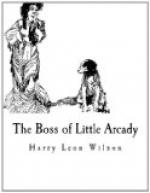“Look at him, gentlemen. Speak to him for me—for I cannot. I ask you to note the condition he’s in.” Here, again, the Colonel burst into tears. “And, oh, my God!” he sobbed, “could they ask me to trust myself to a drunken rowdy of a driver, even if I was going?” Amos was not only sober, he was a shrewd observer of events, a seasoned judge of men. He turned away without further parley. Big Joe told him he ought to be in better business than trying to break up a pleasant party.
As the ’bus started, the strains of “Auld Lang Syne” floated to us again, and we knew the day was lost.
“A hand of iron in a cunning little velvet glove,” said Westley Keyts, in deep disgust as he left us. “It looks to me a darned sight more like a hand of mush in a glove of the same!”
I have often been brought to realize that the latent nobility in our human nature is never so effectually aroused as at the second stage of alcoholic dementia. The victim sustains a shock of illumination hardly less than divine. On a sudden he is vividly cognizant of his overwhelming spiritual worth. Dazed in the first moment of this flooding consciousness, he is presently to be heard recalling instances of his noble conduct under difficulty, of righteous fortitude under strain. Especially does he find himself endowed with the antique virtues—with courage and a rugged fidelity, a stainless purity of motive, a fond and measureless generosity.
To this stage the libations of Potts had now brought him. He began to refresh the crowd with comments upon his own worth, interspersed with kindly but hurt appreciations of the great world’s lack of discernment. He besought and defied each gentleman present to recall an occasion, however trivial, when his conduct had fallen short of the loftiest standards. Especially were they begged to cite an instance when he had deviated in the least degree from a line of strictest loyalty to any friend. Big Joe Kestril was overcome at this. He broke down and wept out upon the shoulder of Potts his hopeless inability to comply with that outrageous request. The entire crowd became emotional, and a dozen lighted matches were thrust forward toward an apparently incombustible cigar with which Potts had long striven.
Recovering from these first ravages of his self-analysis, the Colonel became just a bit critical.
“But you see, boys, a man of my attributes is hampered and kept down in a one-horse place like this. Remarks have been passed about me here that I should blush to repeat. I say it in confidence, but I have again and again been made the sport of a wayward and wanton ridicule. I say, gentlemen, I have always conducted myself as only a Potts knows how to conduct himself—and yet I have been pestered by cheap flings at my personal bearing. Is this courtesy, is it common fairness, is it the boasted civilization of our nineteenth century?”
[Illustration: “AND YET I HAVE BEEN PESTERED BY CHEAP FLINGS AT MY PERSONAL BEARING.”]




